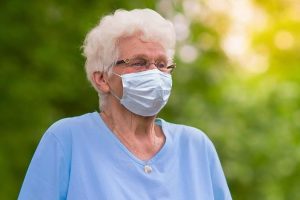Elderly Patients at Highest Risk for Severe COVID Outcomes

Editor’s note: Find the latest COVID-19 news and guidance in Medscape’s Coronavirus Resource Center.
More than 40% of patients aged 80 years or older in the lower mainland of British Columbia remained uninfected by SARS-CoV-2 by July 2023, data indicate. These patients also were at highest risk for severe outcomes such as hospitalization or death.
By the end of two recent population-based, cross-sectional serosurveys that together included 4000 serum samples, patients younger than age 50 years had the highest estimated infection-induced SARS-CoV-2 seroprevalence rates (> 80%), and those aged 80 years or older had the lowest rate (57.7%). Patients aged 70-79 and those aged 80 years or older had the highest risks for hospitalization and death.

Dr Danuta Skowronski
“Adults aged 80-plus years had about 10 times higher risk of hospitalization [from a first infection] than children under age 5 years, and about 10 times higher risk of death than the next-oldest age band: 70 to 79 years,” lead author Danuta M. Skowronski, MD, a physician epidemiologist at the Immunization Programs and Vaccine Preventable Diseases Service of the British Columbia Centre for Disease Control (BCCDC) in Vancouver, told Medscape Medical News. “These findings have implications for vaccine prioritization and healthcare system planning as we enter the autumn and winter of 2023.”
The data were published online October 30 in the Canadian Medical Association Journal.
Highly Vaccinated Population
“The BCCDC initiated a population-based serosurvey protocol back during the 2009 influenza pandemic to guide risk assessment and response,” explained Skowronski. The protocol has been adapted and deployed 10 times during the pandemic to monitor SARS-CoV-2 infection rates, she said. “It uses anonymized, residual sera from patients of all ages and both sexes attending for blood draw at the only outpatient laboratory network in the lower mainland of British Columbia, spanning the greater Vancouver and Fraser Valley regions, where more than 60% of the provincial population resides.”
For this study, SARS-CoV-2 seroprevalence estimates were derived from a convenience sample of 2000 patients each from the ninth and tenth serosurveys, which were performed in December 2022 and July 2023, respectively. In each survey, the researchers examined 200 samples per age group (0-4 years, 5-9 years, and by 10-year category through age 80 years or older). The study population’s median age was 39.5 years; half the participants were female and half were male.
Infection-induced seropositivity was defined as detection of anti-nucleocapsid protein (anti-NP) antibody, and any seropositivity (vaccine- or infection-induced) was defined as detection of anti-NP, anti-spike 1 protein (anti-S1), or both. The number of first infections was estimated based on the intersurvey difference in cumulative infection-induced seroprevalence.
The researchers also examined population census data and public health surveillance data on hospital admissions and deaths from first-ever SARS-CoV-2 infection.
The risks for hospitalization (< 0.3%) and death (< 0.1%) due to first SARS-CoV-2 infection were low overall. The risks “started to increase at about 50 years of age, while remaining consistently below 1% and 0.1% until 80 years of age,” said Skowronski. This result translated to a hospitalization rate of about 1 in 100 newly infected adults aged 70-79 years and 1 in 30 newly infected adults aged 80 years or older. It yielded a fatality rate of about 1 in 900 newly infected adults aged 70-79 years and 1 in 80 newly infected adults aged 80 years and older.
“Our estimates of the severe outcome risks due to first-ever infection were derived in a highly vaccinated population,” said Skowronski. “Risks are anticipated to be greater among unvaccinated and lower among previously vaccinated individuals.” Accumulating evidence suggests that patients with a history of vaccination and infection are at lower risk for severe COVID-19 outcomes than patients with neither or either exposure, she added. The rate of severe outcomes is expected to be even lower among patients with a history of vaccination and previous infection. These patients represent most of the Canadian population.
“The main message is that while the risk of severe outcomes due to COVID-19 is low for the majority of the population, seniors, notably those age 80 years and older, remain at highest risk and warrant continued prioritization for vaccination,” Skowronski added. “As in the autumn of 2022, risks may be compounded by cocirculation of other respiratory viruses that also have disproportionate impact on older adults.”
Prioritize Elderly Patients
Commenting on the findings for Medscape, Zain Chagla, MD, associate professor of medicine at McMaster University and head of the infectious diseases service at St. Joseph’s Healthcare in Hamilton, Ontario, said, “This is a very well-done study, as it uses random blood samples, therefore minimizing volunteer biases from survey-based methodology.” Chagla was not involved in the research.
Although most Canadians have had a COVID infection, the elderly population has been infected at a lower rate, he said. “This means that there are still a number of elderly individuals that are still experiencing first infection, where there is the highest risk of complications.”
One weakness of the study is that it relies on anti-NP testing for infection-induced immunity, Chagla added. “This [factor] has been shown to be more transient in highly vaccinated populations, and therefore the study likely underestimates the population prevalence of prior infection and subsequently overestimates the hospitalization and fatality rates, given that the denominator is larger.”
Regardless, he added, the study “still emphasizes the need to prioritize elderly individuals for vaccination and therapeutics.”
The study was partly funded by the Public Health Agency of Canada and the Michael Smith Foundation for Health Research. Skowronski reported that grants from the Canadian Institutes of Health Research and the BCCDC Foundation for Public Health were paid to her institution for other SARS-CoV-2 work.
Co-author Romina Reyes, MD, MSc, is chair of the British Columbia Diagnostic Accreditation Program committee. Co-author Bonnie Henry, MD, MPH, is the Provincial Health Officer with authority under the emergency provisions of the Public Health Act and thus authorized the provision and analysis of the anonymized sera used in this study. Chagla has served as a director, officer, partner, employee, advisor, consultant, or trustee for Avir, Merck, Pfizer, GSK, and AstraZeneca. He has received a research grant from Roche.
CMAJ. Published October 30, 2023. Full text
Kate Johnson is a Montreal-based freelance medical journalist who has been writing for more than 30 years about all areas of medicine.
For more news, follow Medscape on Facebook, X (formerly Twitter), Instagram, YouTube, and LinkedIn
Source: Read Full Article